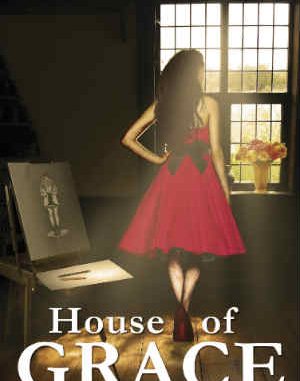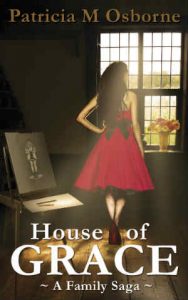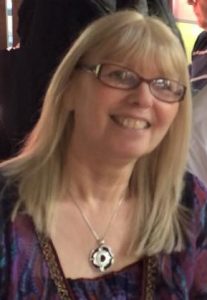
Patricia M Osborne is in her early 60s, married with grown-up children and grandchildren. She was born in Liverpool, spent time in Bolton as a child, and now lives in West Sussex. In September 2018, Patricia finished an MA in Creative Writing with the University of Brighton and graduated with a Merit. She is a novelist, poet and also writes short fiction. Many of her poems and short stories have been published in various literary magazines and anthologies. Her debut novel, House of Grace, A Family Saga, set in the 1950s/60s was released in March 2017.

What inspired you to set your novel in the 1950s?
I was born in the 50s so I love writing about it but also I wanted to avoid the war era, although the aftermath of war still impacted life, for example, with rationing, but I chose this era mainly because my mum was seventeen in 1950. Grace, my protagonist, is sixteen when the story starts so this meant my mum could answer lots of my questions.
Your novel picks up on the contrast between classes at the time. How did you set about researching the very different backgrounds of the central characters?
The working class characters were easier because I studied George Orwell’s, Road to Wigan Pier as part of a writing course and one of the assignments was to write about ‘a day as a coal miner’s wife.’ This is when Grace was born. So I had a coal miner’s wife but needed to do more with it. I therefore decided to do a reverse of the regular rags to riches story. Using what I had learned from the George Orwell study, I was able to portray the coal-dusted pavements, backyards and how the wives would be bringing back in their washing to wash again. 11 Bamber Street in Wigan is a fictitious address, but I based the two-up-two-down terrace on a house I lived in as a child. Other experiences of my own I was able to use consisted of the tin bath by the fire and the outside toilet. In House of Grace, Alice gets excited when the rag and bone man comes around her street. I can remember that excitement and delight when we were allowed to take out rags and get a balloon on a stick as payment. The cobbled streets and women polishing their steps is another strong memory.
For Grace’s upbringing, I upped the standards of my mum’s childhood. She wasn’t of noble birth, like Grace, but if you compared her background to my dad’s it was very different. He was one of seven children, his mum a widow and they were poverty-stricken. Dad told me stories of how he had to walk to school in bare feet.
Mum’s household had a telephone, fitted carpets, nice furniture, and she was able to have singing, dancing and piano lessons. Also I used today’s standards; children of today have no idea what it’s like to wake up to icicles on the inside of your bedroom window, or being squashed in a bed with at least two others or putting a kettle on the gas to have hot water, and only one room in the house heated, and that was by a coal fire.
For Granville Hall, I visited a lot of National Trust places and in particular, the mansion at Wakehurst Place in Sussex which became Granville Hall. I also read a lot of books and watched historical family sagas on television. The internet is a great resource too. For instance I researched what a bathroom in a stately home would look like in 1962 for the second book, ‘The Coal Miner’s Son.’ I was then able to describe it in the first person point of view of the nine-year-old protagonist when he first arrived at Granville Hall. He likened the painted glass windows to his local church.
Do you envisage moving these characters and their families into future decades, exploring the social and cultural changes that happen shortly after the end of this plot?
Yes, I have just finished Book 2, ‘The Coal Miner’s Son,’ which is told using dual narratives, George, a nine-year-old boy, and Elizabeth, Grace’s sister. It begins in 1962 and runs until 1971. Book 3, (untitled) is in progress and opens in 1980 and will run until at least the 90s so will see lots of changes.
How did you get into writing?
I have always loved writing, particularly poetry, and won my first competition at school when I was seven. I remember it was titled ‘Clothes’ but can’t remember anything else about it. I continued to write poetry throughout my life, I could draft out a poem for any occasion in no time at all. However, it was only when I began studying for my BA Humanities degree with the Open University, which up until this stage had been music module based, that I opted for creative writing and started to take it more seriously. To be honest I got quite a shock when, as I began to learn the technical tools, my muse became stifled. I always wrote in end rhyme and now I was moving to free verse. It was only at the end of the first module that I signed up for an online concrete/visual course and I let my inhibitions go. It was wonderful to be able to move words all over the page and enjoy the white space without worrying about how it would be marked. After that I began the advanced creative writing course and found I had my muse back and the technical tools to work with. For my dissertation I completed a screen play, ‘House of Grace’, and it was only then that I realised I could write a novel. There was so much more story to be told before and afterwards. So I created Part I with young Grace and recreated Part II from the script – Grace as a woman. In 2014 my mum died, I’d been looking after her for seven years so now had an almighty void. Not only had I lost my wonderful mother but also I now had all this free time that needed filling. My husband suggested I take up an MA, which I’d always said I wanted to do, so in September 2014 I signed up for a brand new creative writing course with Brighton University. I took a long route, four years, but by doing that, I feel it made me a better writer. I graduated with a Merit in February this year.
How do you go about planning your novels?
Now that’s an interesting one. For House of Grace, I already had Part II in the form of a screen play. For that I’d planned each scene and so I took the same method for Part I. Everything was planned from beginning to end before I started the story. However, Book 2, ‘The Coal Miner’s Son’ I started by planning the chapters out but then last November I signed up for NaNoWriMo with a friend and we were doing a collaborative blog on our process so I had to take off my editor hat and just go for it. I actually wrote three different endings before I found the right one for George. This seemed a much better way to work because when I went back in to do the layering and editing it didn’t take me hours to warm back into the story so I decided that this is the way I’d work for Book 3 although I may have to plan a little. So I’ve moved from being a planner to a pantser.
How do you balance the fact and the fiction when writing this type of novel?
This is something I don’t find hard because my characters are fictitious. I can step into any character and place and become anyone I want to be. It’s about having ideas and imagination as well as using facts.
One of the areas that my website is looking at currently is the way that history is interpreted and presented to the general public. How do you go about deciding how to portray your characters and the events in which they become involved in?
Because I tend to write in the 50s and 60s, I am able to use my own memories to portray how things were. If I look back to the changes in the last fifty years it’s almost like another life. Growing up in a house with no carpets but bare floorboards, no double glazing or central heating and waking up to icicles inside your window during the winter months. No telephones: if you wanted a telephone then you’d walk to the nearest phone box, particularly annoying when dating and your boyfriend can’t let you know that something has happened to prevent him turning up. A small black and white television with only two channels and no remote control to just sit there and switch the channel, you had to get up. Meters for electricity, gas and the television. Excitement when the meter man turned up because he’d give a rebate and the delight counting the coins for Mum as a young child. No indoor toilet so at night-time a bucket was required and having to take turns in carrying the waste downstairs the next day. And horror when a sibling used it for number two! The stench. Sitting in a tin bath by a coal fire on bath night. Not realising how hard that was for Mum, having to fill it up heating tin buckets on the stove and then lugging it out to the backyard to drain.
Imagine today if we suddenly had no hot water, couldn’t have a shower every day? We complain when we’re cold but do we really know what cold is these days? No internet. Shock horror. Bashing at a manual typewriter. How things have changed. I could go on.
However, what I don’t portray through my memories I do by reading historical fiction and watching period dramas.
Which authors have been most influential to your own writing to date?
I’m not sure I could single out a specific author as I read across all genres, but readers have said that my writing is like an early Barbara Taylor Bradford. I take that as a huge compliment. I’ve read numerous Catherine Cookson, Maureen Lee, Lyn Andrews, Barbara Taylor Bradford, Danielle Steele and Ruth Hamilton books over many years so perhaps without realising they have influenced my writing.
Have you got any plans for future books that are in a historical setting?
Yes, the second in the series of House of Grace, ‘The Coal Miner’s Son’ will also be historical, set in the sixties, and I have a started novel set in the fifties. That one won’t be finished though until I have finished Book 3 of House of Grace which is a little later and begins in 1981 and runs through the decade. The books in House of Grace series may be read as a trilogy or standalones.
What advice would you give to an aspiring author?
I think the main advice would be not to be put off by rejection, rejection is part of writing. Join a writers’ group, either online or face to face for feedback. It’s a free tool so why not use it? And it’s also great fun having a network of writers around you. I’d be lost without my forum. And finally, make sure the manuscript is polished before seeking publication.
Blurb for Book
It’s 1950 and all sixteen-year-old Grace Granville has ever wanted is to become a successful dress designer. She dreams of owning her own fashion house and spends her spare time sketching outfits. Her father, Lord Granville, sees this frivolous activity as nonsense and wants to groom her into a good wife for someone of his choosing…
Grace is about to leave Greenemere, a boarding school in Brighton. She’s blissfully unaware of her father’s plans when she embarks on a new adventure. The quest includes a trip to Bolton’s Palais where she meets coal miner, Jack Gilmore. Grace’s life is never the same again.
Travel with Grace through two decades as she struggles with family conflict, poverty and tragedy. Is Grace strong enough to defy Lord Granville’s wishes and find true love? Will she become a successful fashion designer? Where will she turn for help?

Author Biography
Patricia M Osborne is in her early 60s, married with grown-up children and grandchildren. She was born in Liverpool, spent time in Bolton as a child, and now lives in West Sussex. In September 2018, Patricia finished an MA in Creative Writing with the University of Brighton and graduated with a Merit. She is a novelist, poet and also writes short fiction. Many of her poems and short stories have been published in various literary magazines and anthologies. Her debut novel, House of Grace, A Family Saga, set in the 1950s/60s was released in March 2017.
Where can you find me?
Patriciamosbornewriter.wordpress.com
patricia.m.osbornewriter@gmail.com
Facebook: Patricia M Osborne, Writer
Twitter: PMOsborneWriter
Where can you buy a copy of House of Grace?
http://mybook.to/HouseofGrace in paperback and Kindle form. Free to read with Kindle Unlimited.
House of Grace in paperback may be ordered from all good bookstores and libraries by quoting ISBN 9780995710702.
Related Content
See our full collection of articles and interviews relating to Historical Fiction here.
Leave a Reply
You must be logged in to post a comment.